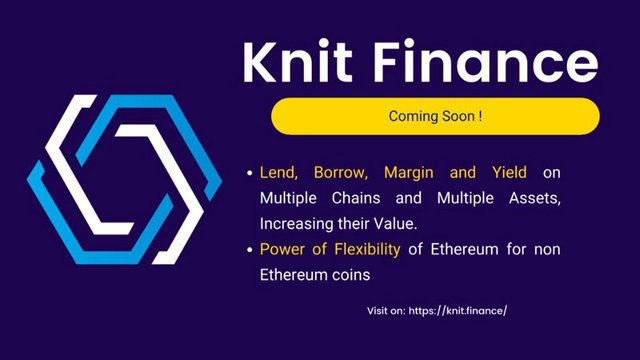Knit Finance
Hello all of you. Welcome back to my blog Today I would like to introduce you to the KNIT Finance project. It is a unique decentralized protocol that combines cross-chain aggregation, Bridges and real-world markets with interest, lending, trading and escrow services via smart contracts. It also allows cross-chain liquidity aggregation in fully verifiable 100% transparency. Community-led initiatives.
Cryptocurrency trading has become an important part of the e-finance grand street. This is where you can exchange fiat currency or currencies such as US dollars or euros. These deals with buyers and sellers. There are basically two types of transactions; Combine transactions and transactions. Cross transactions are listed, for example affiliate affiliation
They often continue to work on communication topics for beginners who tend to take advantage of their view of the user-friendly and interactive interface in their operation. The consolidation transaction tasks are performed and categorized. Not at the smallest level, such as access to offers, decentralized accessories.
These are some of the most important on the market, as they are better protected. Official transactions still don't require any representation of character, likewise, security issues such as a decentralization overhaul have emerged. Don't save money to customers and vice versa, specially connected clients, show that you don't need to emphasize the security of crypto transactions. For any client package, let's discuss using decentralized transactions in transactions, which reduce liquidity.
KNIT.Finance is the next generation of the DeFi protocol which aims to link multiple non-Ethereum chains to ERC20 in Phase 1. Any lockable digital assets can be utilized with KNIT. opening up billions of dollars and commercial access can be proof of censorship.
Anything that is decentralized should be available to anyone and everyone. But today's DeFi relies mainly on ERC-20 tokens. The ERC-20 standard has been proven to be suitable for decentralized lending, productivity lending and agriculture, etc. However, this does not include the participation of other assets from independent blockchains. These assets and their supporting tools were a major barrier to joining DeFi. KNIT.finance solved this problem in one failure.

Why choose KNIT.Finance?
Knit.Finance creates tremendous opportunities for altcoin and Ethereum DeFi. The protocol that integrates new assets into the Ethereum network is highly liquid and allows them to connect to existing profit-making opportunities.
The Protocol You Deserve
Are you a non-ERC-20 token holder? How many times have you felt the need to convert your holdings into ERC-20 tokens to participate in DeFi? Being crypto enthusiasts and traders ourselves, that is one of the main obstacles we face. We believe in embracing multiple cryptos from multiple chains and not just one. We also believe in DeFi. But the two ideals never seemed meant for each other. So, we came up with a unique decentralized protocol that helped us and the crypto community to enter DeFi without ever leaving our holdings - the multi-chain bridge to DeFi.

1. Each coin
For every coin seller, we offer the option to transact and make the most of their money in the DeFi room. Coins (Example: LTC) that were previously outside the scope of DeFi will now have full access to all DeFi features.
2. The flexibility of the ERC-20 standard
The ERC-20 standard is known to be flexible, has the highest transferability and accessibility to the second largest blockchain network in the world. Every coin now has the opportunity to take advantage of Ethereum's flexibility.
3. Global liquidity group
A global liquidity pool is being opened for Ethereum and vice versa.
4. Read World Property
Stocks, gold and fiat can be pooled to trade on a Decentralized Exchange, which is basically a decentralized decentralized asset, giving traders more power.
5. Community oriented
100% of this token management will be done through the community.
6. DAPP
DAPP can now access tokens on other blockchains using only their Ethereum nodes via the KNIT token aggregate. They can also accept payments using this token.


Komentar
Posting Komentar